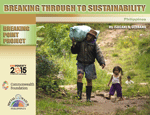Social Watch News
Published on Thu, 2014-07-03 19:35
Last week, human rights advocates had a reason to celebrate, as the United Nations Human Rights Council, meeting in Geneva, decided on June 26, 2014 to establish an open-ended intergovernmental working group whose mandate is to elaborate a legally binding instrument on transnational corporations and other business enterprises with respect to human rights. Not only is the resolution a big achievement in itself. It is also a powerful message of hope to all those in the trenches of facing human rights abuses as a result of the unchecked growth of borderless corporate influence. It proves that people organized across borders, and their political action, still can make a difference. The resolution was achieved against big odds, and even as companies exerted pressure to knock it down, directly and through their influence on important governments. In fact, many governments did not withstand the pressure and voted against, such as the case of United States and many European countries in the Council, while others preferred to abstain. |
Published on Wed, 2014-07-02 17:33
Breaking Through to Sustainability By Isagani Serrano Social Watch Philippines, 2014. |
Published on Mon, 2014-06-30 23:56
The United Nations Human Rights Council (HRC) adopted, through a vote, a historic and significant resolution to start a process for an international legally instrument on transnational corporations. Officially entitled “Elaboration of an international legally binding instrument on Transnational Corporations and other Business Enterprises with respect to Human Rights” (A/HRC/26/L.22) the resolution was adopted on 26 June at the 26th session of the HRC. The resolution was co-sponsored by Ecuador and South Africa, and also supported by Bolivia, Cuba and Nevezuela. In the vote on the resolution, 20 Members of the HRC supported the resolution, while 13 Members abstained, and 14 Members voted against it. |
Published on Fri, 2014-06-27 19:35
The Declaration of the G77 Summit, held in Santa Cruz on 14-15 June, has sections on three prominent issues that are presently the subject of negotiations at the United Nations - the Millennium Development Goals (MDGs), the Sustainable Development Goals (SDGs) and the UN's Post-2015 Development Agenda. The Declaration should thus have significant influence on the UN negotiations since it reflects the positions of the G77 and China, at the highest political level, and these positions can be expected to be maintained by the Group during the negotiations on these three issues. |
|
Published on Fri, 2014-06-27 10:46
» |
Published on Fri, 2014-06-27 09:53
A stand-alone goal on addressing inequality continues to see a serious divide between developing and developed countries. Member States in the Open Working Group (OWG) on Sustainable Development Goals (SDGs) that met at its 12th session on 16-20 June in New York are negotiating a set of goals and targets based on a "zero draft" prepared by the OWG Co-Chairs Ambassadors Macharia Kamau (Kenya) and Csaba Korosi (Hungary). They met in "informal-informals" mode on 9-11 June with intense work on the first seven proposed goals as the July deadline for the OWG's work draws closer and continued in this mode into the week that was originally scheduled to be in a formal mode. |
Published on Fri, 2014-06-27 09:13
A resolution was adopted in the UN Human Rights Council on June 26 that will begin the process of elaborating an international legally binding instrument on business and human rights. Despite strong opposition from the EU and US, the resolution received affirmative votes from 20 member States on the Human Rights Council, while 13 States abstained. France, Germany, Italy and Ireland were also among the 14 opposing countries. This victory in the promotion of human rights was welcomed by the Treaty Alliance, a group of networks and campaign organizations collectively working to organize advocacy in support of developing binding international regulation to address corporate human rights abuses. A statement calling for an international legally binding instrument has been signed by 610 civil society organizations and social movements and 400 individuals from 95 countries. Additionally, the Subcommittee on Human Rights of the European Parliament and the Vatican have made statements supporting the creation of such an instrument. |
Published on Thu, 2014-06-26 19:25
2015 marks both the target date for the achievement of the Millennium Development Goals (MDGs) and the 20-year review of the Beijing Platform for Action (BPfA). As governments discuss progress made on the MDGs and the BPfA and make commitments on international development and women’s rights for the coming decades, what kinds of financial and fiscal policies are needed to achieve human rights, sustainable development, and gender equality in the post-2015 global development agenda? |
Published on Thu, 2014-06-26 19:17
Political will and political power and sustainable policies at national level as well as national policy space and fair international trade, money and finance systems are essential to tackle poverty and inequality, according to experts at an eminent panel discussion at the UN Conference on Trade and Development (UNCTAD) last week. The experts on the panel were discussing best policy practices for tackling poverty and inequality on the road to achieving sustainable development. The discussion took place in a round-table session on 19 June, during UNCTAD's two-day Public Symposium (18-19 June), which this year coincided with UNCTAD's own fiftieth anniversary celebrations. |
|
Source: . Published on Wed, 2014-06-25 00:00
When the United Nations began negotiating a Code of Conduct for Transnational Corporations (TNCs) back in the 1970s, the proposal never got off the ground because of vigourous opposition both from the powerful business community and its Western allies. |
SUSCRIBE TO OUR NEWSLETTER









